When it comes to pursuing a career in design engineering, the decisions made during the K12 educational phase can have a profound impact on long-term success. Strategic course selection and a clear focus on future goals are essential components of the journey toward higher education, including master’s degrees such as MEng (Master of Engineering) and MSc (Master of Science). Understanding how early education influences career outcomes can help students and parents make informed decisions.
How K12 Education Influences Future Careers
The K12 phase, spanning from kindergarten to 12th grade, is a formative period in a student’s academic and personal development. During this time, exposure to STEM (Science, Technology, Engineering, and Mathematics) subjects plays a critical role in shaping interests and aptitudes. Students who develop a strong foundation in math and science are better prepared for the rigorous demands of design engineering programs at the undergraduate and graduate levels.
Key factors in early education that affect career planning include:
- Course selection: Advanced Placement (AP) or International Baccalaureate (IB) courses in math, physics, and computer science can provide a competitive edge.
- Extracurricular activities: Participation in robotics clubs, coding competitions, or engineering camps fosters practical skills and passion for the field.
- Mentorship: Guidance from educators and industry professionals can help students navigate their options and set realistic goals.

MEng vs MSc: Which Path Suits Your Goals?
For students aspiring to design engineering roles, pursuing a master’s degree is often a necessary step. However, choosing between an MEng and an MSc can significantly influence career trajectories. Both degrees offer advantages, but they cater to different types of learners and career aspirations.
Master of Engineering (MEng):
The MEng is typically a practice-oriented degree designed for those aiming to enter the workforce immediately after graduation. It focuses on applied knowledge and industry-specific skills. Many programs include internships or co-op opportunities, enabling students to gain hands-on experience. This degree is ideal for students who want to work as engineers, project managers, or consultants.
Master of Science (MSc):
In contrast, the MSc offers a more research-intensive curriculum. It is suited for students interested in academic or research careers. The MSc often requires a thesis and involves in-depth study of theoretical concepts. Graduates with an MSc are well-prepared for doctoral programs or roles in research and development.
When deciding between these two options, students should consider:
- Career goals: Do you prefer hands-on engineering roles or academic research?
- Program structure: Does the curriculum align with your learning preferences?
- Long-term plans: Are you planning to pursue a PhD or enter the workforce directly?

Making Informed Decisions Through Career Planning
To ensure that K12 education aligns with future goals, students and parents should prioritize career planning early. This involves setting clear objectives, researching educational pathways, and seeking opportunities to gain exposure to the field of design engineering.
Practical steps include:
- Exploring design engineering programs at top universities and understanding their prerequisites.
- Engaging in internships or shadowing professionals to gain real-world insights.
- Using career counseling resources to evaluate the benefits of pursuing an MEng or MSc.
Additionally, students should regularly assess their progress and adjust their plans as needed. Flexibility and adaptability are key traits for navigating the evolving demands of the engineering industry.
Conclusion: The Role of Early Choices in Lifelong Success
Ultimately, the path to a successful career in design engineering begins well before college. By leveraging the K12 years to build a solid foundation in STEM and exploring options like MEng and MSc degrees, students can position themselves for rewarding and impactful careers. Early planning, combined with thoughtful decision-making, ensures that students are equipped to meet the challenges and opportunities of the engineering world.
For more information about the differences between MEng and MSc degrees, consult reliable sources such as Britannica’s overview of engineering or Prospects’ guide to postgraduate study.
Readability guidance: This article uses short paragraphs, clear transitions, and lists to summarize key points. Active voice and concise sentences maintain readability, while technical terms are explained for clarity.


